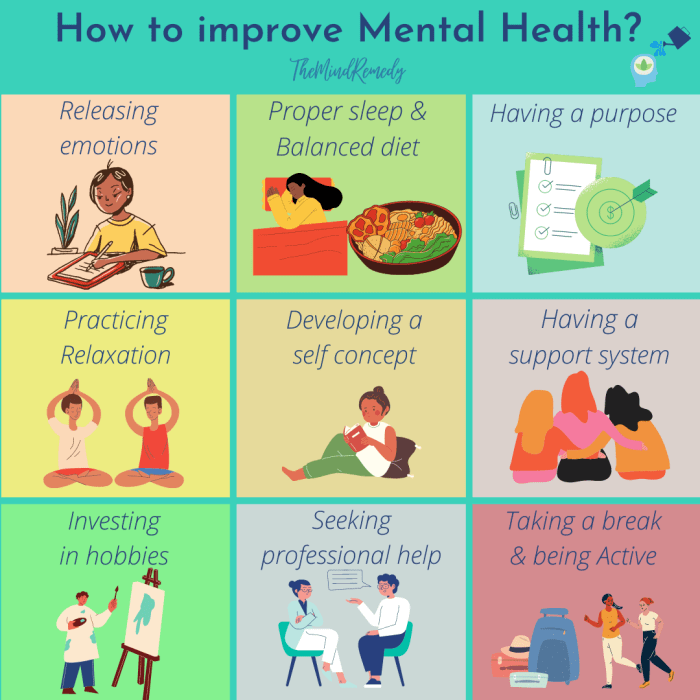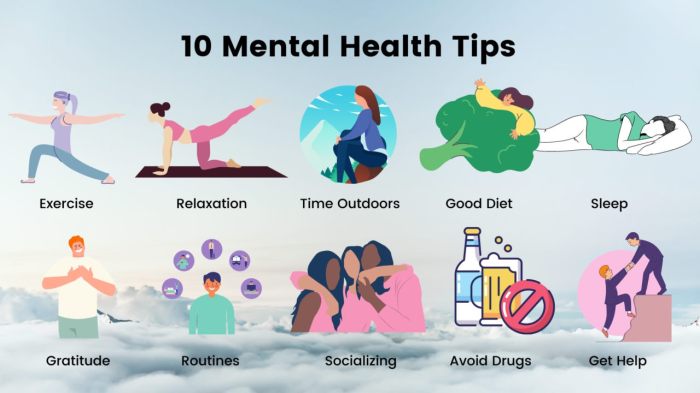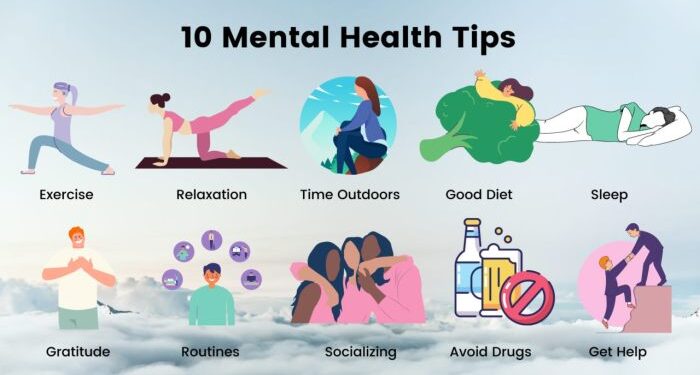Embark on a journey towards better mental health naturally with this guide. Explore the importance of mental well-being and discover how simple lifestyle changes can make a significant impact.
Importance of Mental Health
Mental health is crucial for overall well-being as it encompasses our emotional, psychological, and social well-being. It affects how we think, feel, and act, playing a vital role in how we handle stress, relate to others, and make choices.
Impact of Poor Mental Health on Daily Life
Poor mental health can have a significant impact on daily life, leading to issues such as decreased productivity, difficulty in maintaining relationships, and a decline in overall quality of life. It can also manifest in physical symptoms such as headaches, digestive problems, and insomnia.
Benefits of Improving Mental Health Naturally
- Enhanced resilience to stress and challenges
- Improved mood and emotional well-being
- Increased energy levels and motivation
- Better cognitive function and focus
How Mental Health Affects Physical Health
There is a strong connection between mental health and physical health. For example, chronic stress and anxiety can weaken the immune system, making individuals more susceptible to illnesses. Additionally, conditions such as depression have been linked to an increased risk of heart disease and other chronic health issues.
Healthy Lifestyle Habits
Maintaining healthy lifestyle habits is crucial for improving mental health naturally. These habits encompass various aspects such as nutrition, exercise, sleep, and mindfulness practices like meditation and yoga.
Nutrition's Role in Mental Health
Nutrition plays a vital role in mental health as the food we consume directly impacts our brain function and mood. A diet rich in fruits, vegetables, whole grains, and lean proteins can provide essential nutrients that support brain health. Omega-3 fatty acids found in fish, nuts, and seeds have been linked to reducing symptoms of depression and anxiety.
Additionally, staying hydrated and avoiding excessive intake of processed foods and sugars can help maintain stable energy levels and mood.
Importance of Regular Exercise
Regular exercise is not only beneficial for physical health but also plays a significant role in improving mental well-being. Physical activity releases endorphins, often referred to as "feel-good" hormones, which can help reduce feelings of stress, anxiety, and depression. Engaging in activities like walking, running, yoga, or strength training can boost self-esteem, improve sleep quality, and enhance overall mood.
Significance of Quality Sleep
Quality sleep is essential for mental health as it allows the brain to rest, recharge, and process emotions effectively. Lack of sleep can lead to cognitive impairment, mood swings, and increased stress levels. Establishing a consistent sleep routine, creating a relaxing bedtime environment, and avoiding stimulants like caffeine before bed can promote better sleep quality and ultimately support mental well-being.
Benefits of Mindfulness Practices
Mindfulness practices such as meditation and yoga can help reduce stress, improve focus, and promote emotional regulation. These practices encourage individuals to stay present in the moment, cultivate self-awareness, and develop a sense of calmness amidst daily challenges. Incorporating mindfulness techniques into daily routines can enhance overall mental clarity, resilience, and emotional balance.
Stress Management Techniques

Stress can have a significant impact on mental health, leading to symptoms such as anxiety, depression, and even physical health issues. It is important to address stress effectively to maintain overall well-being.
Effective Stress Management Techniques
- Practice Mindfulness: Engage in activities that bring your focus to the present moment, such as meditation or deep breathing exercises.
- Exercise Regularly: Physical activity can help reduce stress levels and improve mood by releasing endorphins, also known as "feel-good" hormones.
- Get Adequate Sleep: Lack of sleep can exacerbate stress, so prioritize getting enough rest each night to support mental well-being.
- Connect with Others: Talking to friends or loved ones can provide emotional support and help alleviate stress through social connection.
Relaxation Exercises
- Progressive Muscle Relaxation: This technique involves tensing and then relaxing different muscle groups in the body to release physical tension.
- Guided Imagery: Visualizing calming scenes or scenarios can help reduce stress and promote relaxation.
- Deep Breathing: Taking slow, deep breaths can activate the body's relaxation response and reduce feelings of stress and anxiety.
Setting Boundaries to Reduce Stress
- Learn to Say No: It's important to prioritize your own well-being and not overcommit to tasks or responsibilities that can cause undue stress.
- Establish Work-Life Balance: Create clear boundaries between work and personal time to prevent burnout and promote relaxation.
- Avoid Negative Influences: Limit exposure to people or situations that contribute to stress and surround yourself with positive influences instead.
Social Connections and Support
Building and maintaining social connections is crucial for mental health as it provides a sense of belonging, reduces feelings of isolation, and offers emotional support during challenging times.
Importance of Healthy Relationships
- Cultivate open and honest communication with friends and family to strengthen relationships.
- Engage in activities together to create shared experiences and memories.
- Show empathy and actively listen to others to show that you care.
- Set boundaries and respect each other's needs to maintain healthy relationships.
Benefits of Seeking Support
- Sharing thoughts and feelings with loved ones can alleviate stress and promote emotional well-being.
- Receiving support from others can boost self-esteem and confidence.
- Knowing that you have a support system can increase resilience in facing life's challenges.
Community Activities for Social Connections
- Join a local club or organization related to your interests to meet like-minded individuals.
- Volunteer for community events or charitable causes to contribute positively and connect with others.
- Attend social gatherings, workshops, or classes to expand your social circle and engage in meaningful interactions.
- Participate in sports or group fitness activities to bond with others while staying physically active.
Time in Nature
Spending time in nature has numerous benefits for our mental health. The calming effects of natural environments can help reduce stress, anxiety, and depression, leading to improved overall well-being.
Activities in Nature
Engaging in activities like hiking, gardening, or simply being outdoors can have a positive impact on mental health. These activities allow us to connect with nature, breathe in fresh air, and disconnect from the stressors of everyday life.
- Going for a hike in the mountains or a walk in the park can help clear the mind and improve mood.
- Gardening has been shown to reduce symptoms of anxiety and depression, while also providing a sense of accomplishment and purpose.
- Simply spending time outdoors, whether it's sitting in a park or taking a stroll on the beach, can help lower cortisol levels and promote relaxation.
Remember to unplug from technology and fully immerse yourself in the natural surroundings to reap the full benefits.
Incorporating Nature into Daily Routines
There are simple ways to incorporate nature into our daily routines, even if we live in urban areas. Taking a walk during lunch break, sitting in a nearby park, or adding indoor plants to your workspace can all help bring a touch of nature into your day-to-day life.
- Try to spend at least 20-30 minutes outside each day, whether it's going for a walk, reading a book in the backyard, or sitting on a bench in a nearby green space.
- Consider joining a gardening club or volunteering at a community garden to connect with others and nurture your mental well-being.
- Plan weekend outings to nature reserves, botanical gardens, or national parks to fully immerse yourself in the beauty of the natural world.
Final Thoughts

In conclusion, enhancing your mental health naturally is achievable through various practices discussed in this guide. Take the first step towards a healthier mind and body today.
FAQs
How does nutrition affect mental health?
Nutrition plays a crucial role in mental health as certain nutrients can impact mood and cognitive function.
What are some effective stress management techniques?
Effective stress management techniques include deep breathing exercises, mindfulness meditation, and physical activity.
Why are social connections important for mental health?
Social connections provide emotional support, reduce feelings of isolation, and contribute to overall well-being.









![Sleep Statistics By Mental Health and Facts [2024*]](https://br.genpi.co/wp-content/uploads/2025/09/VaNVZ-health-issue-impacting-sleep-75x75.png)
![Sleep Statistics By Mental Health and Facts [2024*]](https://br.genpi.co/wp-content/uploads/2025/09/VaNVZ-health-issue-impacting-sleep-350x250.png)
